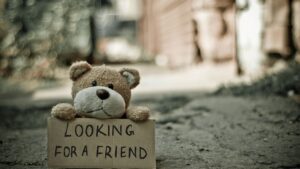Fewer Friends – Do You Also Suffer From A Loss Of Friends?

Friends for life! There are few of them, and they become fewer and fewer as the years go by. The general experience that the circle of friends shrinks with increasing age has even been scientifically proven.
When you’re young, you collect friends just like influencers collect followers on Instagram nowadays. New ones are always being added. When you were at school, you couldn’t invite all your peers to your house for your birthday that you wanted to have there. Today, you’re lucky if you can get just five good friends together for a birthday dinner. We’re not talking about acquaintances here, but really good friends. As we get older, such friendships become even rarer than they already are and are difficult to find or keep.
Studies show that from the age of 30, one person is lost from the circle of friends approximately every five years. It’s a kind of natural decline, so to speak. The main cause is certainly the naturally changing phases of life. Studying abroad, marriage, the birth of a child, a change of job or place of residence all cause friendships to break up.
“The clique scatters in all directions. Different lifestyles make it difficult to keep in touch,” explains Professor Eckart Hammer, a social scientist at the Evangelische Hochschule Ludwigsburg. Unfavorable for the individual, considering that humans as social creatures need a certain degree of closeness. Of course, this cannot be generalized, as this level is lower in loners than in extroverts. At least that’s what psychologists say. However, it is also difficult to prove scientifically how many close relationships a particular person needs.
Let’s call it a loss of friends
The phenomenon is not new. Prof. Dr. Cornelia Wrzus, Psychological Aging Research at the University of Heidelberg, investigated it back in 2011. During her time at the Max Planck Institute for Human Development in Berlin, she and three colleagues analyzed 277 studies on this topic. The core result of the meta-study “Social Network Changes and Life Events Across the Lifespan” confirmed that a person’s general social network grows during their youth. As people grow up, the number of friendships gradually decreases and continues to do so over the course of their lives.
Another result of the meta-study shed light on relationships within the family. The result was that the number of family members with whom there is close contact remains constant throughout life, but shifts: in youth, parents, uncles, aunts or grandparents tend to be important constants, while grandchildren, nephews and nieces are important constants in old age. What remains the same is the number. Incidentally, this applies to all people around the world; hardly any differences were found between cultures.
Fewer friends – a global trend
The Americans coined the term “friendship recession” for this in 2021. It was based on a study by the American Perspectives Survey, in which 12% of Americans said they had no friends. In the age group of 18 to 29-year-old women in particular, 16% stated that they no longer had regular contact with most of their social contacts. This trend has quadrupled since 1990.
A global trend, according to the “Mental State Of The World In 2022” report by Sapien Labs. More than 407,000 people from 64 countries took part in the survey. The surveys made it clear that the ability to maintain important friendships and relationships had declined sharply over the past 12 months. This was particularly noticeable among young people aged between 18 and 24 and older people over 75.
It’s never too late…
To avoid being alone in old age, you should cultivate friendships early on. Hammer recommends: “You can also write a letter to your boyfriend or girlfriend and emphasize how important the other person is to you.” Another good option is to simply think about who you know from the past but have lost sight of. This is where the internet can be particularly helpful in reviving an old acquaintance.
Special senior platforms, similar to dating sites, can also help you find exactly the right new friend for you. “Precise pre-selection gives you the chance to build deep friendships once again,” says Professor Dr. Sven C. Voelpel, age researcher at Jacobs University Bremen and internationally active age researcher. After all, it’s never too late to make new friends. “You’re old if you don’t start anything new,” says Professor Hammer.

CultureAndCream Author from Munich
To travel during my profession as a beauty journalist was never enough for my. Also my six month on a world trip didn’t do it. It always attracts me to other cities, foreign countries, on roadtrips and places I don’t know yet. But I am not only interested in “culture” and “cream”, I am also fascinated by people who have stories to tell . Such unique experiences I want to share with you.


